Pharma industry has a bright future
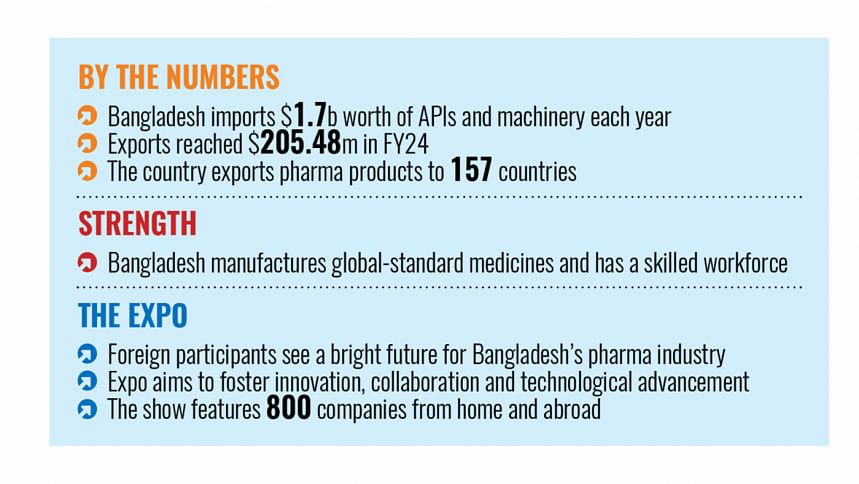
Foreign participants at the 16th Asia Pharma Expo foresee a bright future for Bangladesh's pharmaceutical industry, given its continuous product development and expanding global footprint.
"Bangladesh's pharmaceutical sector has shown really impressive development. The country manufactures medicines of global standard and has developed a highly skilled workforce," said Lashimikanth Enaganti, assistant general manager of Smilax Laboratories Limited, India.
He was speaking to The Daily Star at the venue of the 16th Asia Pharma Expo and Asia Lab Expo, organised by the Bangladesh Association of Pharmaceutical Industries at the Bangladesh-China Friendship Exhibition Centre in Purbachal.
Enaganti praised Bangladesh's progress, highlighting its high-quality medicine production and skilled workforce. His company, which produces 60 types of active pharmaceutical ingredients (APIs), exports to 10 leading Bangladeshi pharmaceutical firms. He sees this growth as mutually beneficial for both countries.
Deepak Shah, director at Mumbai-based Titan Laboratories Pvt Ltd, echoed this observation. His company, a supplier of 20 types of APIs, has been exporting to Bangladesh for over two decades and has witnessed the sector's significant progress.
"Our export volume to Bangladesh is increasing," he added.
Monjurul Alam, CEO of Beacon Medicare Limited, said that Bangladesh imports around $1.2 billion worth of APIs annually. He emphasised that events like the Asia Pharma Expo help local companies source new ingredients and advanced machinery, supporting industry expansion.
International suppliers have also noted the sector's development. Klaus N Moller, head of sales and service at Germany's Process Technology Pharma, has been supplying pharmaceutical equipment to Bangladesh for 24 years. Initially providing small-scale equipment, his company's sales grew alongside the industry's expansion.
Moller also mentioned that his company has set up a factory for commissioning.
Halimuzzaman, managing director of Healthcare Pharmaceuticals, noted that Bangladesh imports approximately $500 million worth of pharmaceutical machinery, primarily from Europe, to ensure quality. He emphasised the importance of the expo in connecting local manufacturers with cutting-edge technology.
The event was inaugurated by Zakia Sultana, senior secretary of the Ministry of Industries. She underscored Bangladesh's ability to meet 98 percent of its pharmaceutical demand through local production while exporting to 157 countries.
However, she acknowledged the challenge of API import dependence. To address this, the government has established an API Industrial Park in Gazaria, Munshiganj, with the aim of boosting local API production, reducing import reliance, and cutting costs.
"With 27 pharmaceutical companies allotted plots, the park is expected to enhance research, attract foreign investment, and prepare the industry for Bangladesh's LDC graduation in 2026," Sultana said.
She encouraged stakeholders to capitalise on these opportunities, pointing out that capturing even 1 percent of the $400 billion global generic drug market could generate $4 billion in export revenue.
Md Shameem Haidar, director general of the Directorate General of Drug Administration, highlighted the pharmaceutical sector's contribution as the second-largest revenue generator for the government.
Initially focused on domestic demand, the industry now exports to 160 countries, including highly regulated markets such as the US, UK, Canada, Australia, and the EU.
He noted that leading Bangladeshi firms have obtained major Good Manufacturing Practice (GMP) accreditations, including US FDA certification. Additionally, Bangladesh's National Drug Control Laboratory (NCL) is progressing toward achieving WHO Maturity Level 3 recognition.
Haidar emphasised the expo's role in fostering collaboration, innovation, and technological advancements in pharmaceutical manufacturing and research.
Md Saidur Rahman, secretary to the Health Services Division, credited local pharmaceutical companies for making medicines affordable and ensuring quality healthcare. He acknowledged their contributions to Bangladesh's health sector through the production of world-class medicines.
Speaking at the event, Abdul Muktadir, president of BAPI, expressed concern over the ongoing gas crisis, saying it affects the cost-effectiveness of pharmaceutical products.
This year's expo is being participated in by 800 companies from 32 countries, including the US, China, UK, Germany, Malaysia, India, Thailand, Italy, Japan, Switzerland, Taiwan, and Ireland.
The event showcases advancements in pharmaceutical processing and packaging, biotech lab equipment, API manufacturing, and contract pharmaceutical manufacturing.
By bringing together domestic and international entrepreneurs, the expo provides valuable insights into the latest pharmaceutical technologies, equipment, and raw materials.
The three-day Asia Pharma Expo will conclude on February 14, remaining open daily from 10:00am to 6:00pm.
With Bangladesh already fulfilling 98 percent of its domestic pharmaceutical needs before exporting to 157 countries, the country's role in the global pharma industry continues to strengthen.

 For all latest news, follow The Daily Star's Google News channel.
For all latest news, follow The Daily Star's Google News channel. 

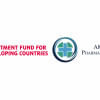
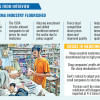


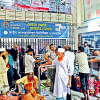

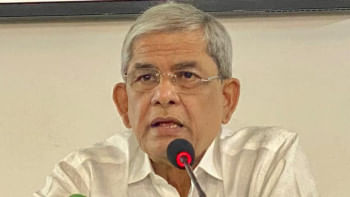
Comments